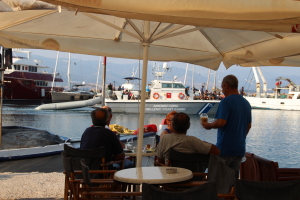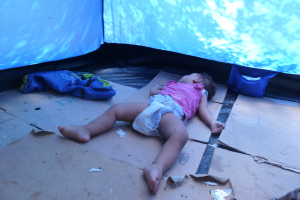With many other routes to Europe now considered too dangerous, thousands of refugees are traveling from Turkey to the Greek island of Lesbos, where a humanitarian disaster is in the making. By Claus Hecking for DIE ZEIT, translated into English by Handelsblatt Global Edition.
Molyvos , 30/07/2024 - Tourists in the cafés along the promenade sip their breakfast lattes as the coast guard boat chugs into the harbor of Molyvos. Like almost everyday, it brings new refugees to the small town on the Northern Coast of the Greek island of Lesbos.
Today, there are 43 Syrians crowded on deck. Men, women and children wearing water wings and red life vests, who only minutes earlier were adrift on the open sea. The coast guard vessel tows their gray rubber boat in its wake. The refugees have been saved, at least for the time being.
Some are calling Lesbos the “Greek Lampedusa,” as it is as swamped with refugees as the Italian island. It’s a humanitarian crisis in the making in a country already in dire straits itself.
How is it the main route for refugees to central Europe now goes through Lesbos, a tiny place with only 86,000 local inhabitants? How are thousands of foreigners to be fed and cared for, with Greece itself on the brink of ruin?
The coast guard ship docks on the quay wall. Meryam, six, lets herself be picked up and set on land by a man wearing a facemask and rubber gloves. She slips out of her brightly colored plastic life preserver and looks around at her new world. Her mother holds her two-year-old sister in her arms. Leyla Rawadi, 32, beams with joy as she imagines she and her little girls are now safe. She is, after all, in Europe. Yet she and the other Syrians – the names of the refugees have been changed in this story to protect them – have little idea what awaits them on Lesbos.
„We are travelling to a place near Berlin“
Some new arrivals press buttons on their smartphones, looking in vain for a WiFi. “When do we get something to eat?” asks a woman with red fingernail polish. Most of the refugees were middle class back at home: students, doctors, lawyers, and teachers. Greece is just a way station for them. Most of them want to go to Germany.
“We’re traveling to a place near Berlin, to my husband,” said Ms. Rawadi. Her husband, Ahmad, is a civil engineer who fled the civil war and the forces of the Islamic State in May. Immediately after arriving in Germany, he applied to bring over his family. Authorities told him it could take some time, so his little family set off on its own, taking a refugee smuggler’s bus to Beirut, a smuggler’s boat to Mersin in Turkey, a refugee smuggler’s bus to Izmir and, finally, another illegal boat to Lesbos. They paid $1,000 (€920) per person.
According to the United Nation’s refugee agency, up to 9,000 people a week travel from Turkey to Lesbos with 77,000 refugees arriving in Greece since the start of the year.
Many consider the route across North Africa to Italy too dangerous because of chaos and conflict in Libya, so more and more people attempt the eastern Mediterranean route with the new path leading directly through Lesbos. Most refugees likely are unaware Greece is fighting bankruptcy, banks are closed and municipalities are running out of money.
„We are being treated like animals. This is Europe, isn’t it? Why are they doing this to us?“
Mohammed Mansour, Syrian refugee
The rubber dinghy carrying Ms. Rawadi and her daughters suddenly broke down five kilometers off the Greek coast. Efforts to repair the outboard motor in the dark failed and it fell into the water. The boat was adrift and the right air chamber was leaking air when the coast guard vessel came along.
“These people were lucky,” said Rafail Tsamouras, leader of the patrol. “We discovered them in time with thermal imaging cameras. And we didn’t have to save another boat just then.”
There’s just a single coast guard patrol boat in use. That’s not nearly enough when 10, 15 or 20 overcrowded rubber boats head north night after night for Lesbos, but there are no funds for additional rescue ships. If not for the lady running the Captain’s View harbor restaurant and compassionate tourists, who pay to send cheese sandwiches and water to the new arrivals, the Syrians would have nothing at all in their stomachs.
„No, no! Police, Police!“
Dozens of refugees drag themselves up the street from Golden Beach to the mountain village of Sikamenea. Here, where the switchback road is so steep cars must travel in first gear, they trudge along the side of the road with rucksacks on their shoulders and the blazing midday sun on the back on their necks. It’s 90 degrees Fahrenheit (32.2 degrees Celsius) in the shade. Some of the men have fashioned hats for themselves from cardboard boxes. Women in black burkas carry children in their arms. They come from the Middle East, Southern Asia or Africa. They share one goal: reaching the main city on the island, is around 30 miles (48.2 kilometers) away in the scorching heat.
Two routes lead from the beaches in the north of the vacation island – where Lesbos is closest to the Turkish coast – to two refugee camps on the southern end. At the camps, the refugees are given the paper they have risked everything to get: a temporary residence permit for six months in Greece. It’s a license to leave Lesbos.
Dozens of cars roar past the columns of refugees, but none stop. Drivers are forbidden to pick up refugees because a Greek law makes giving aid to unregistered immigrants a punishable offense. Those who do so risk being suspected of trafficking. Strictly speaking, citizens aren’t allowed even to give the refugees some water.
Many refugees seem to know the law. “No, no! Police, police!,” a woman with a baby on her shoulder and a little boy in hand yelled when this reporter’s car slowed next to her. Sweat was on her forehead and fear was in her eyes. She looked almost a child herself. She ran a few paces further, but then turned around and heaved herself and her children into the backseat, while calling for her husband, who was further up the road. The family, which hails from Afghanistan, insisted on getting out of the car when the next village came into sight, saying, “Maybe police.” Mytilene remains about 22 miles away. The family must spend the night somewhere in the wilderness.
Dora Tsogali has been caught before. Last Sunday, Mytilene harbor police arrested the 24-year-old student. She had seven Afghans in her small car including a mother of two who was six months pregnant. Police impounded the vehicle, interrogated Ms. Tsogali and locked her up for a night. The public prosecutor filed charges and she appeared in court last Thursday, but a sympathetic judge dismissed the case. On Friday, Greece’s parliament lifted the transport ban.
Still, many of the stranded must continue to march on foot. According to the coast guard, there are only three busses available on the entire island to transport refugees. And no one knows who is supposed to pay for all the gas. The administration is broke. So, that means people like Ms. Tsogali must make a lot more trips to the two refugee camps, well aware her passengers will face the worst there.
“Sit down! Sit down!” The bald man in uniform motions the men down with a truncheon. Hundreds squat before him in the dust at the entrance to the camp in Karatepe, near the island’s capital. They hope their name will finally be called and that they will get their residence papers and at long last leave this dirty hole.
Two months ago, the island’s mayor erected a few tents and portable toilets on the ruins of an old traffic training area with declared the declared goal, “Getting the refugees out of the city center so that the tourists don’t have to see them anymore.” Since the official camp in Moria was hopelessly overcrowded for weeks, immigrants had been spending the nights on the beaches and in the alleyways of the old town. Karatepe was originally intended to house 600 people. On this afternoon, more than 2,500 are crowded together in the camp, which long ago spread out into the adjoining olive groves.
Behind the barbed wire fence, it reeks of all manner of human excretions imaginable. Women wash themselves in greenish puddles. Empty plastic bottles and chips bags, melon rinds and chewed-clean chicken bones are piled between the tents. When the delivery truck with the evening meal arrived last Tuesday, hundreds of starving camp inhabitants plundered it. Karatepe wasn’t even resupplied in the following days.
Mohammed Mansour, his wife, his son and his daughter-in-law squat on the ground. The wife cooks canned lentils from the Lidl supermarket near Karatepe on a fire made with cardboard. “We have never gone through anything like this in our whole lives,” said the 51-year-old pharmacist from Damascus. “We are being treated like animals. This is Europe, isn’t it? Why are they doing this to us?”
The Mansours planned every detail of their flight, parking their savings in foreign accounts to pay for hotels and restaurants on their way to Germany. But they cannot access their money on Lesbos. All banks have been closed because of the debt crisis.
„We are experiencing a human catastrophe and everybody is leaving us on our own.“
Spyros Galinos, mayor of Lesbos
Even hard-boiled refugees are shocked by conditions at Karatepe. “Come, look,” said Palestinian woman, who lived for years in the Yarmouk camp near Damascus. She opens the cheap blue tent she bought herself. Inside, the heat is stifling, and an eight-month-old baby lies motionless on a piece of cardboard while swarms of flies circling around his diaper. The family has been waiting eight days already for their travel papers.
“We are doing all we can,” said Sypros Galinos, 62, the mayor of the island as he sucks on an e-cigarette in his darkened office in the heart of Mytilene. His municipality doesn’t have enough finger print scanners or enough staff and there’s not a penny left in the till, said the mayor, who is a member of the right-wing populist Anel Party.
“We are experiencing a human catastrophe and everybody is leaving us on our own,” Mr. Galinos said.
A few months ago the mayor sent urgent letters to Greece’s government and European Commission President Jean-Claude Juncker seeking support, but Athens has no money. And Brussels? Mr. Juncker’s said they passed the matter to Dimitris Avramopoulos, the Greek E.U. commissioner for migration, who so far hasn’t responded, Mr. Galinos said.
Asked by the German weekly newspaper DIE ZEIT, a spokesperson for Mr. Avramopoulos said on Tuesday, “An answer is on the way.” Mr. Galinos demands action: “If we don’t get help, we will lose control.”
The ferry from Mytilene back to the mainland port of Piraeus was full after authorities produced a pile of travel papers in the preceding days. Dozens of refugees stood on the upper deck, laughing and taking photographs with Lesbos as the backdrop. They looked in many ways like they were on vacation.
Then, their attention was drawn downward. A coast guard ship full of people was docking. The supply of refugees won’t dry up any time soon. Almost two million Syrians are waiting across the water in Turkey. Many have the same goal: Germany.


